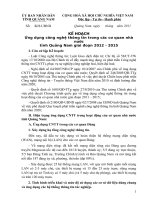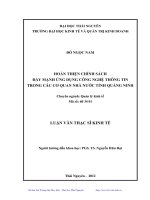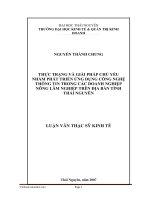KẾ HOẠCH ỨNG DỤNG CÔNG NGHỆ THÔNG TIN TRONG các DOANH NGHIỆP NHÀ nước THÀNH PHỐ hải PHÒNG e
Bạn đang xem bản rút gọn của tài liệu. Xem và tải ngay bản đầy đủ của tài liệu tại đây (95.99 KB, 14 trang )
THE IT APPLICATION PLAN FOR MANAGING ADMINISTRATIVE STATE
1. The real situation of IT application in managing Vietnam’s administration.
Government office has been assigned the task of researching and implementing the
project of computerization of state administration in 1990 by the Council of Ministers.
To perform this task, in the period from 1991 to 1997, the Government Office has
deployed four schemes, including: two projects were funded by the French
government (the period of 1991 - 1993 and 1994 - 1996); a scheme was invested by
the state budget according to the national IT program (period 1996 - 1998); a wide
area network scheme of the Government ,based on the Prime Minister's Decision No.
280/TTg on April 29th , 1997.
The technical infrastructure created by the four aforementioned schemes in the past
,has made the foundation for the computerization of managing and operating the state
administrative agencies in the country; It promotes the formation of information
systems,the electronic data repositories; It serves for the direction and administration
of the Government, the Prime Minister and government at all levels.
According to the Work regualtion of the Government issued together with Decree No.
11/CP on January 24th , 1998, since 1998, the Government Office has been relagated to
manage the wide area network of Government in a unified way ; otherwise it has
agreed to direct the work of computerization of state administration within the
Government, ministries, ministerial-level agencies, the agencies attached to the
Government and local government levels.
To synchronize with the state administrative reform program for the period of 2013 2010, the Prime Minister decides that the overall scheme of computerizating the state
administrative management in the period 2013 - 2015 includes the following main
contents and the Government Affairs Office presides, coordinates with ministries,
ministerial-level agencies, the agencies attached to the Government and People's
Committees at all levels to implement.
1
2. Some overall assessments of the situation of computerizating the state
administration in the past
1. In 1990, the Standing Council of Ministers approved the project of IT application
and techinical information at the Government Office (Dispatch No. 1265/TH on
January 24th , 1990 of the Government Office ,informed the decision of Standing
Council of Ministers).
The mission of the project is to computerize the management information system at
the Government Office, to support some equipments, the technology, to train staffs for
10 ministries, 10 key provinces,to prepare the conditions to build the wide- local
information network connected to all the ministries, branches and localities.
At the end of 1993, the Government Office has built the local area networks (LAN)
and initialy, applied the modern IT in the direction and administration of the Prime
Minister, linked the informations with a number of ministries and People's
Committees of some key provinces.
Although the early IT application in government offices is still inceptive, with the
attention and the direction of the Prime Minister, the computerization of state
administration in Government Office has put the foundation for the computerization
of management and administration in the state administrative agencies.
2. After issuing the Resolution No.49/CP on the IT development (August 1993), the
Prime Minister has approved the five-year plan (1995-2000) to implement the IT
national program. In the period of 1996 - 1998, the program has focused about 50% of
the budget (160 billion dong)for the target of computerizating the state management
information system. The first step is to build the technical infrastructure for the
computerization of state management and IT application, in the specialized
management activities.
Based on this infrastructure, the state administrative agencies have gradually
implemented the information systems, the electronic data repositories for the
management and administration of the Prime Minister, the ministries and other
government agencies at all levels.
Until now, the system of local area networks in 61 provinces ,cities directly under the
Central Government, and in most of the ministries, ministerial-level agencies, the
2
agencies attached to the Government had been set up. This system includes the
operational information systems, records management and datastore for research,
support the process of executive decision-making.
The government wide area network is set to link the center information networks in 61
provinces, cities, and nearly 40 key agencies of the Government with the scale of
2,500 workstations, 180 servers across the country and 50 different application
programs. With the Government's wide area network, the state administrative agencies
have made to transfer, receive the multidimensional informations, including the legal
normative act system, the regular and irregular reporting systems,and electronic
mail…, to ensure the quick, safe and effective direction and administration of the state
administrative agencies.
Along with the construction of the Government's wide area network, six national
databases have been developed, including: the national database of finance, social and
economic statistics, law, land and resident. By the end of 1999, these national database
schemes completed the feasibility study. In which, two national databases of finance,
statistics have data serving well for the direction and administration of the
Government.
The training IT work has been carried out in sync with the construction of information
systems in state administrative agencies. Tens of thousands of professionals, staffs
trained through the basic computer science courses and in fact they used the computer
at various levels in their professional work; especially among them, a relatively large
rate used IT tools effectively to access and exchange information on the network, had
good service for research work to complete assigned tasks.
At the end of 1997, Vietnam has joined the INTERNET. More informations given
from the INTERNET network, have contributed informations and datas significantly,it
helps for the direction of the Government, the Prime Minister and other state agencies
in policy- making .
3. However, compared with the goal of computerizating the operating information
systems outlined in Resolution No. 49/CP August 5th , 1993 of the Government, the
actual results achieved are limited.
3
The main reason is that the levels of branches, locals do not recognize the role of IT in
the direction, operating; not combine between IT and the process of administrative
reform,not renew the modes of leadership, direction and management; expressed as
follows:
- About macro operating: the IT national program was invested in 1996 and ended in
early 1998 with a budget of 280 billion dong; including the task of computerizing the
administrative state with the cost of 160 billion dong. In this context, many large items
have been approved by the Prime Minister in the overall plan which was not
implemented.
The project of computerizating the state administration of ministries and provinciallevel People's Committees are only made one part. The capital investment to
computerize 160 billion dong in three years from 1996 to 1998 met only 20 - 25% of
the funding needs of the approved schemes of 100 administrative agencies at ministry
and province level.
According to investigation of the Government Office, most of the computerization
project are stopped; several agencies have the ability to invest in the target state
management computerization, but it is developed in the the own direction of
technology; other agencies wait for the guideline of Government’s unit general
development. The national databases just only meet about 10% of the invested capital
demand (30 billion dong). Therefore, the national databases stop at the stage of
completion of feasibility testing and deployment, donate funds to continue
implementation of the scheme.
- Based on the information appears: Many ministries,braches consider their
management informations as the private informations of departments,they do not see
them as a national assets or offering inadequate aggregate data to other agencies
sufficient information for policy and decision- making. Many officials and civil
servants in the state apparatus at the central and local level, have a habit of
accumulating private informations, when there have the informations under their
charge,they do not update in the computer network for general use
- Datas on computer networks: the system of IT infrastructure has been built in a
certain degree, it permits to transfer, receive multi-dimensional information. There are
many informations generated in the course of administrative activities, but the
4
accumulation of information in electronic form only stops at low level; just some kind
of basic informations are accumulated. The main reason is that the levels, the
departments have not firmly attached to the IT application to handle everyday tasks,
not implemented the administrative discipline in updating electronic informations, not
reformed administration strong enough to take the computerization system in the
operation of the state administrative apparatus.
- In terms of organizational structure: So far, there is no general provisions on the
location, function and task for the unit in charge of “the project of computerizating the
state administration in the state agency”; It does not even have ranks, no titles for staff
working in IT. For this reason, the state administrative agencies do not attract the good
technical experts, therefore, the acceptance of technology transfer and direct the
implementation of the project are very limited; the principles of open system, the
general standard of technology and information is not monitored closely.
- About the financial mechanisms: Since 1998, funding for computerization of state
administration transferred to the recurrent budget, because the ministries, branches,
localities do not enough investment funds to complete the projects, not continue to
implement the basic applications in management and administration. The basis of the
IT infrastructure of the various state administrative agencies, basically, is same as the
status of 1998.
- Because the communications charge is too high, the ministries,departments which
visit much on a wide area network of the Government, have to spend tens of millions
dong per month for the north-south communications backbone. Office of the People's
Committees of localities must also spend millions dong per month for operating a
large network. Meanwhile,the recurrent budgets of the administrative agencies are
limited, leading to many ministries, branches and People's Committees of localities
have limited use because of the high cost of network transmission. This has restricted
the effective use of info network and the effectiveness of management and
administration of state agencies.
- About the skills to use IT network in the routine work of public servants: Despite
training, officials and civil servants have not really familiar with working on a
5
computer network (update, coordinate processing, etc.), they mainly do with
documents and available datas on the network.
- From the practical implementation of the IT national program in the years of 1996
-1998, on the basis of assessing the achieved results and the shortcomings and
weaknesses, it can draw the following lessons:
- Firstly, the computerization of state administration is a complex task because it based
on high technology and related to function, task, organizational structure and authority
of the state administrative agencies , to the process of administrative reform, it
requires the high uniformity throughout the state administrative system. Therefore, it
must have the specialized information technology department which is responsible for
coordinating the work computerization.
- Secondly, this task can not be considered as a simple service, it is the process of
creating electronic data information in order to improve the effectiveness and
efficiency of the operating work,and it is the key to reform administrative.The
computerization process has just started and it will last for years, so it can not put it
into the type of work regularly and thus, it needs to apply regulations to ensure
funding as for type of work regularly.
-Thirdly, the investment for this work is too small if compared with the investment in
business systems, banking, finance, aviation .... So it needs to have enough investment
to ensure that the systems work together.
- Fourthly, it needs to attach much importance to computer training for staffs and
employees in the state administrative agencies. The system’s technology can not have
function well if government officials and civil servants, who work in administrative
system, do not know how to operate the computer and do not have the discipline of
computer operation..
- Fifth, it needs to attach much importance to the building of the datastore, especially
the national one and the specialized territorial one; it needs to have the system of
managing computerization ,to strengthen the supervision and inspection of
computerization plan as part of the plan of socio-economic development.
- Sixth, it must have the measures for the organization, the staff in the computer
working unit , in administrative offices based on the unified regulation, because there
is no unified organization, the unified system can not be built.
6
3. The content of computerizating the state administration period of 2013 - 2015
3.1. Common goal.
The overall objective is reflected in the following aspects: building information
systems for management of state administrative agencies; at the end 2015, bringing
electronic information systems of government into activities.
- It closes together with the objectives of the State administrative reform program,
boosts the modernization of administrative technology,implements to computerize the
processes serving the people in the areas of public services, improve the capacity of
state administrative agencies that are convenient, fast and high quality.
- Training IT for staffs, civil servants, creating access to and use of new technology in
routine work, in order to meet the high requirements on the efficiency and quality of
work.
3.2. Specific objectives.
● Develop the system of computerizating the state administration management,
directly serves for the direction in the system operating. Complete and uniform the
application of serving management program (e-mail, send and receive electronic
documents, records management, personnel management, etc.).
● Build and integrate the national database, firstly in some key ministries (including 6
national database schemes): Planning and Investment Bank ,Trade, Customs, Labor,
Justice, Education, Health for general use. Computerization of public services in order
to improve the capacity of state administrative agencies in serving the people and
businesses convenient, fast and quality assurance.
● IT training: universalize IT for leaders, professional staffs and administrative bodies
above the county level to be able to use computers and computer networks in
managing work regularly in accordance with the assigned functions.
● Promote the reform of administrative procedures in the field of State management,
reform the organizational structure and working style in the state administrative
agency under the authority of the Government,based on attaching objective of
computerization of state administration with administrative reform program of the
Government.
7
4. Investment (period 2013 - 2015)
4.1.The architecture requirements of the state administrative managing
computerizating system:
The system consists the components: the data information system is relatively
independent with the ministries, ministerial-level agencies, the agencies attached to
the Government (hereinafter referred to as the Ministry) and the People's Committees
of provinces and cities under the Central Government (hereinafter referred to as
provinces). The components of the system have the horizontal and vertical relations.
The horizontal relation is the exchange, sharing specialized informations of each
branch.
The vertical relations is mainly based on the hierarchical structure of authority, state
management function in the system of state administrative agencies.
Based on the info requirments to perform the management tasks within each
organization,the computerization should be done from the ministries, ministerial-level
agencies, the agencies attached to the Government and the provincial-level People's
Committees . At the top of each system (the province) it will form an integrated
central database under its charge. This center which is not a place to update, store the
operating datas , is a place to link the database's operational units in each system. The
center has function of providing, sharing general information,transmissing the oders
through the legal documents, the administrative office of the competent administrative
authority.
The center integrates database of each system realation with others according to the
type of horizontal relationships through the integrated database center of government.
Thus, the Integrated database Center will form at the following levels:
a) The level of Government: the Integrated database Center located in the wide area
network center of the Government. (Government Office);
b) The level of Department: the Integrated database Center located in the ministries,
ministerial-level agencies, the agencies attached to the Government;
8
c) The level of Province: : the Integrated database Center located in the Office of
People's Councils and People's Committees of provinces.
The Integrated database Center of government has the functions and tasks linking
databases of ministries, ministerial-level agencies, the agencies attached to the
Government, the provincial-level People's Committees, sharing general information
between these units, in order to serve the direction and administration of the Prime
Minister and the State and province administrative agencies.
The Integrated database Center of government also provides common
communications between ministries, branches and provincial-level People's
Committee through the Government's wide area network.
The Integrated database Center of department links the database of the Ministry,
including the businesses unit under the vertical direction in the People's Committees
of the localities; provide and share informations between the units in the Ministry and
the People's Committees through the Integrated database Center of government.
The Integrated database Center of province has the function of linking the operating
database of departments, branches, districts, towns and provincial cities and
communes in the province, sharing information for the direction and administration of
the provincial-level People's Committee presidents and other units in the province.
The Integrated database Center of province also provides common communication
infrastructure among the departments, branches, districts, towns and provincial cities,
communes, wards through the province's wide area network .
On the basis of above analyzing the system of computerization of state administration
will prioritize investment in the Central database integration, support communication
axis horizontal links between the Ministry, the People's Committees provincial level.
4.2. Government's wide area network.
The wide area network of government is built with Decision No. 280/TTG April 29 th ,
1997 of the Prime Minister, is designed and built according to the hierarchical
architecture of the state administrative agencies and is divided according to the
following levels:
- Level A: The level of Government,
- Level B: The level of ministry, province,
9
- Level C: The level of departments, branches, districts, and units of the Ministry
- Level D: The level of commune.
In A and B level, they will form the integrated database center.
The administrative units of Ministry and province level will link together through the
Government's wide area network, through network centers located in government
offices.
The provincial-level administrative units will contact each other through the wide area
network center of the province located in the Office of the People's Council, People's
Committee of the province.
The units under departments, provinces, branches contact through a wide-area
network of provinces and government (illustrated in the below diagram).
PA (Government)
PB(Ministry,
branch)
PC(Bureau,department,
equivalent unit)
PB( Province people’s
council)
PC(Office)
PD(Commune,ward,
town,…)
PC(District..)
The architecture diagram of the wide-area network of government level
The administrative units of Ministry and province level will link together through the
Government's wide area network, through network centers located in government
offices.
The provincial-level administrative units will contact each other through the wide
area network center of the province located in the Office of the People's Council,
People's Committee of the province.
10
The units under departments, provinces, branches contact through a wide-area
network of provinces and government (illustrated in the below diagram).
CPNNET
The network
intergration center of
Ministry
The network
intergration center of
Province
Department,
office, branch….
The diagram associated department,office,branch to ministry,branch through
CPNNET
The Government's wide area network (called CPNET state) has been designed in
architecture of the state management computerization system, including:
- A north-south communication axis with the speed of 64 KB type X25,
- 35 ISDN lines connecting 35 the ministry units to the Government’s Office.
- Connect 61 Offices of the People's Council, the provincial-level of People's
Committees with CPNET network; many provincial People's Committees have
expanded Government’s network down to the agencies of departments, districts,
communes, wards.
Thus, CPNET network has been the technical infrastructure of the computerized
system of state management in new investment phase.
4.3. Investment estimation.
4.3.1.The investment requirements:
The investment of “building the system of computerization of state administration”
must comply with the principle objective of building information data; informatics
tool is an important means to achieve the objective. Before deciding to invest, it
should clearly identify: What the information data is, how much the volume of
11
information will have to manage, who managed and how the management is, and the
aim of serving and the readiness of administrative agencies participating in the
system; the coherence degree of the computerized information system with the
administrative reform process of the unit; it just buys the system devices after
deciding the aim and the volume of information needs to build.
The implemention of the computerlization in the state administrative agencies must
comply with the principle of unity network technologies (according to the standards of
the Government's wide-area network) and the application of common use in the
executive the State under the professional guidance of the Government Office. It
needs to pilot the exploitation in some ministries and provincial-level People's
Committees, to provide technology solutions and common programs to the entire
system of state administrative agencies.
The construction of info system has to ensure the sharing and unit info resource on the
network of ministry,province and the government’s wide area network, it avoids
losing the local information.
The investment of expanding network depends on the conditions ,including: the staffs
operating the computer, the exploitation need and the information serving for
management and administration.
- The investment has to implement, based on the spirit of saving, maximum use of the
equipment, engineering, information resources which have been invested in the
previous period .
4.3.2.The decentralized investment.
+ The level of Government:Government invests in the main items such as:
- The data integration center of the Government, the national databases,the
transmission axis , the transmission of data from the Data Integration Center of
government, to the Data Integration Center of ministries and provinces.
It invests some basic items under the scheme of computerization of ministries and
provincial-level People's Committees, to unify technology and applications.
+ Level of ministries, provinces: The ministries, branches and People's Committees
invest to expand the network Center and other databases depending on the ability of
funds, staff and the magnitude of the information systems in each of agencies.
12
It invests to expand the computerization of public administrative services on the basis
of the Government's initial investment.
4.3.3. Funding.
Total cost of the project will be synthesized from the funding of the project of
computerizating the state administration of ministries, ministerial-level agencies, the
agencies attached to the Government and People's Committees of provinces and cities
centrally.
The funding from the central budget investing for the main items of the system,
includes the integrated data center at all levels.
The government, ministerial or provincial level; the national databases ; the trunk
wide-area communication network of the Government and a number of other basic
components are expected no less than 1.000 billion dong for the period 2013 - 2015.
TABLE OF CONTENTS
1. The real situation of IT application in managing Vietnam’s administration..................1.
2. Some overall assessments of the situation of computerizating the state
administration in the past.................................................................................................
2
3. The content of computerizating the state administration period of 2013 – 2015..........
7
13
3.1. Common goal.............................................................................................................
7.
3.2. Specific objectives......................................................................................................
8.
4. Investment (period 2013 - 2015)...................................................................................
9
4.1.The architecture requirements of the state administrative managing
computerizating system.....................................................................................................
9
4.2. Government's wide area network...............................................................................
11.
4.3. Investment estimation.................................................................................................
13.
4.3.1.The investment requirements....................................................................................
13
4.3.2.The decentralized investment...................................................................................
14.
4.3.3. Funding...................................................................................................................
15.
TABLE OF CONTENTS....................................................................................................
16
14









